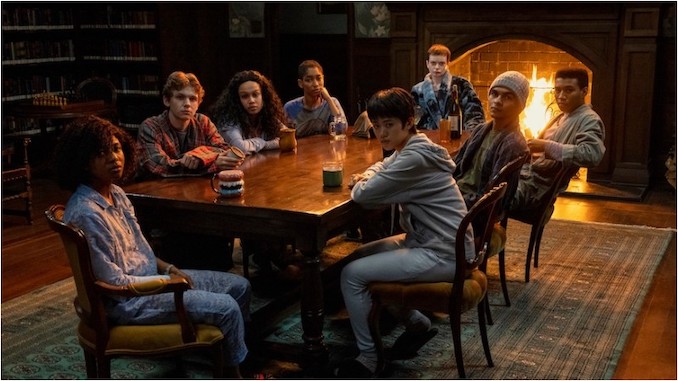Netflix’s The Midnight Club Is About More Than Scary Stories to Tell in the Dark

Horror stories (and no small amount of other genre tales) have long been used as metaphors to discuss difficult real-life subject matter. Buffy the Vampire Slayer was always about the perils of high school and young adulthood as much as it was about creatures of the night, and the wide array of zombies that appear in The Walking Dead have never been as interesting as the dark segments of society their rise ultimately gave birth to. Because, in the end, as scary as these sorts of fictional creatures might be, they’re still monsters that can be understood, fought, and defeated. Unlike real life, which is all too often laced with the sort of unfair loss and tragedy that defies any sort of simple explanation or easy solution. And much like creator Mike Flanagan’s other popular Netflix Hauntings, his latest effort, The Midnight Club, is less interested in horror for its own sake than it is in using the genre as a vehicle to tell larger stories about life, death, and faith.
On the surface, The Midnight Club seems like a fun enough diversion for spooky season—it’s got some pretty decent jumpscares and dark themes spread across its ten episodes, along with a bunch of campfire-style scary stories, and even a weirdo cult thrown in for good measure. But at the end of the day, this show isn’t a murder mystery or a slasher flick. It’s not even a ghost story, at least not in the way you might think it would be. Instead, The Midnight Club is a surprisingly thoughtful rumination on what it means to die, although its deeper truths come wrapped in the bright candy coating of a teen drama.
The series follows the story of the members of the titular Midnight Club, a variety of teens with different ethnicities and backgrounds who all have two things in common: They each have a terminal illness and they’ve decided to spend their last days at the very spooky-looking Brightcliffe Manor. A sort of antique hospice, its director (played by Nightmare on Elm Street legend Heather Langenkamp) claims the institution isn’t a punishment or a prison, rather it exists to give these kids the sort of agency and self-determination over their treatment that the modern healthcare industry—and occasionally their own relatives—so often denies them. Whether that’s true or not will be left up to the viewer to decide, but it’s hard to deny the very real, if unconventional, family that ultimately forms at the series’ center.
Based on Christopher Pike’s young adult novel of the same name, The Midnight Club focuses on eight patients (rather than the book’s five), with a variety of diagnoses and life expectancies. Overachiever Ilonka (Iman Benson) is looking for a miracle in Brightcliffe’s past and serves as our introduction to the institution, where she meets jaded Anya (Ruth Codd); handsome boy-next-door Kevin (Igby Rigney); outgoing Spence (Chris Sumpter); introspective Natsuki (Aya Furukawa); nerdy Amesh (Sauriyan Sapkota), privileged Cheri (Adia); and deeply religious Sandra (Annarah Cymone).
The group meets each evening at midnight to spin stories of all types and genres, in an effort to leave a bit of themselves behind in this world they know they’re destined to soon leave. From Japanese-style horror to 1980s slasher flicks and noir-ish thrillers, the show embraces different storytelling styles to briefly adapt elements of several of Pike’s other young adult novels as the stories the kids tell each other, including Witch, The Wicked Heart, Road to Nowhere, The Eternal Enemy, and more. Pre-existing knowledge of Pike’s books certainly isn’t required to enjoy this show, but Flanagan’s longstanding fandom is evident in the deft, thoughtful ways he ties many of these tales—from separate, unconnected novels!—to the larger arc of their specific storyteller, showing us more about who they are as people and the things their illnesses are forcing them to face. (There’s a reason Sandra’s stories always end with what the rest of the group refers to as “angel porn.”)
-

-

-

-

-

-

-

-

-

-

-

-

-

-

-

-

-

-

-

-

-

-

-

-

-

-

-

-

-

-

-

-

-

-

-

-

-

-

-

-








































